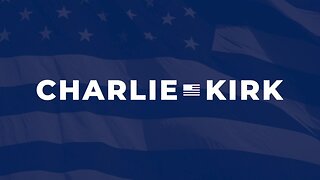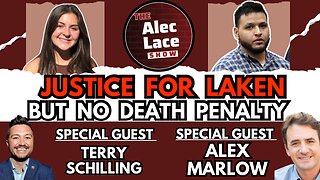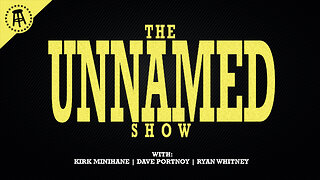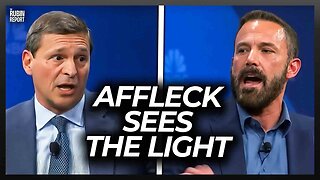Premium Only Content

Ep 105 N8 26th Jan 2024 Ultra Vires Everywhere?
This was a fantastic N8 zoom with Liz.
One of Liz's open sentences says it all
When The State Goes Rouge Thats a Very Dangerous Situation
Every Act of Parliament is like a cage - They keep public sector bureaucrats chained and shackled. This is what is meant by "Application" of an Act
The America constitution came out of the British state going rouge on them. America was a British colony and bled it of resources and so and the people got angry about that.
The first article of their constitution - we are all equal under the law - is basically the same throughout the western world.
The English revolution - Devine Right of Kings - George III was King when America became USA.
Our BoRA contains codified rights from all our ancient rights. The are based on ancient proverbs
For Us The People - Everything That Is Not Forbidden is Allowed but for the People that Administer the law which is the Crown - Everything That is Not Allowed is Forbidden
BoRA rights are individual rights not group rights
We discuss Fluoride, lockdowns where pushed through using BoRA Sec 5
High Court jurisdiction in employment matters
Employment cases that went to the High Court - Butler Case is CIV-2011-404-923, 18 August 2011 High Court, Auckland - Why in the High Court?
Book - Bill of Rights Act New Zealand - Rishworth and Others - Canadian cases are quoted
BoRA applying to employment contracts?
BoRA Sec 3a & 3b - We deep dive in to this - Function and most importantly - Duty
Canada - they have something similar
Public Duty in BoRA Sec 3b - What is the duty of the employer in the public sector, the DHB, Minister of Health, Universities etc etc
Employment Case - GF & Controller of Customs - Judge talks about Tikanga as window dressing. Shane Kinley refers to this saying employers could just go ahead and not look at the safety of the vax.
- A great review of this case
There is heaps more in this zoom - A definite must watch!!!
Thanks Liz!
Timeline show notes:
Section 1 – 00:00:0)
- The episode discusses how everything is allowed under law unless it is explicitly forbidden.
- Reminder of a legal maxim from a previous zoom; A senior English judge, Sir John Laws, stated the principles as: "For the individual citizen, everything which is not forbidden is allowed; but for public bodies, and notably government, everything which is not allowed is forbidden." This poses a problem if the law itself has issues.
- Every act of Parliament controls a regulator, like cages to keep the state chained, as an unchecked state can act dangerously.
- The American Constitution came out of the British state overstepping with the colonies by treating them like a money pot and denying them representation/rights they had in Britain. The cry of the Boston Tea Party. Tensions had been growing for years over issues like taxation without representation. The colonies were taxed by the British but had no seats in Parliament.
- A state is a sovereign political entity that has internal and external sovereignty. It is self-governing. A colony, on the other hand, does not have sovereignty and is governed by an external colonial power.
- New Zealand is not a colony.
- The Declaration of Independence listed 27 complaints against the British colonial administration overstepping. Article 1 lays the foundation for the codified constitution.
- The declaration outlined the natural and legal rights of the colonists and charges against King George III that justified revolution and independence. This included tyrannical acts and refusing consent of legislation.
- Natural/divine rights like life, liberty, punishments trace back to English common law maxims developed over time from religious texts.
- English common law also formed maxims of law, they are like proverbs.
- As long as something is not forbidden by statute, it is lawful. But those administering the law (the Crown) can modify rights if deemed acceptable in a free democracy per the NZ Bill of Rights Act 1990.
- New Zealand Bill of Rights Act 1990: Protects individual rights and freedoms in NZ. However, Section 5 allows rights to be limited if deemed reasonable in a free and democratic society. However, it's been tested lately re lockdowns and fluoride in public water supply.
Section 2 – 00:12:11
- There has been pushback on workers' rights cases going to the High Court instead of the Employment Court, which has exclusive jurisdiction over employment matters.
- In the Yardley case, the judge acknowledged workers' right to retain employment may fall under the Bill of Rights Act Section 28 but couldn't analyse it fully as it was in the High Court.
- Two cases, Butler v Shepherd (2013) and Mighty River Power, were discussed in the appeal for Turners freedom of speech case. Butler involved an employee suing the University of Auckland (state agent) in the High Court over an alleged section 11 Bill of Rights violation from his dismissal.
- The judge said employment issues belong in the Employment Court/Authority. Academic writings (Rishworth. et.al) at the time also argued the Bill of Rights didn't apply to employment contracts due to the “functionality” argument related to Section 3B of the Act.
- The university's actions could fall under 3(b) as a state function, but the case still belonged in the Employment Court.
- The discussion questions where the line is between public law rights that judicial review applies to, and employment rights that belong in the specialised employment jurisdiction.
Section 3 – 00:22:11
- Section 3(a) of the New Zealand Bill of Rights Act concerns limiting the power of the state by binding the executive, judicial and legislative branches in their functions. Bookmark Trudeau and Canadian Charter of Rights and Freedoms equivalent.
- Section 3(b) applies to "any person or body" performing "any public function, power or duty" conferred by law. This could include the CEO of a council or water authority.
- Think about the word “application” as “who is bound and shackled”
- In Butler v Shepherd, the judge focused on the university's "function" rather than its public "duty" as an employer in the public sector to employ people to do the work.
- As an employer, the public sector body has a duty to employ people lawfully and not breach their rights. This was overlooked in favour of arguments from a commentary that said employment contracts fall outside the Bill of Rights.
- Liz analyses how Section 3(b) should properly be applied to public bodies and individuals acting in an official/employment capacity conferred by law, like the university chancellor, rather than focusing solely on institutional "functions".
- Liz explain the difference in how "or" and "and" are used in Acts - "or" makes each option separate, while "and" means both things joined by "and" must be met together for that section to apply. This distinguishes their meaning in terms of applying and interpreting the laws.
- Examples given of public bodies include councils, water authorities, the Ministry/DHBs, and how Section 3B binding applies to their conferred duties as much as functions.
- Putting fluoride in water was a public function imposed on councils by Dr Ashley Bloomfield in his prior role as Director-General of Health. However, this decision was later overturned.
- Section 3B binding on public functions, powers, duties conferred by law on such bodies/employers in the public sector.
- Focus should be on public duties as employers, not just "functions" as overlooked in Butler v Shepherd judgment relying on a textbook. Liz didn’t have time to argue that in the 10 pages.
Section 4 – 00:30:18
- The case of GF v Comptroller of Customs NZ was important as it discussed tikanga Māori and the employer's duty to be a “good employer”. The case and chief Judge Ingles of the employment court gained notoriety by talking about Tikanga.
- The GF case is discussed as an example where an employer's risk assessment around vaccination was deemed inadequate by the Employment Court during an appeal
- The employer claimed to follow tikanga but didn't understand it. All employees, Māori and non-Māori, must be treated equally under tikanga in contracts.
- The link between public law and employment law is the employer's duty under the Public Service Act to be a good employer and follow Treaty principles. Being a good employer is a central concept in employment law, as the employer has responsibility/power over employees. Duties of a good employer include keeping jobs in place where possible and following principles of natural justice.
- This suggests public sector employees could claim Bill of Rights protections as the state exercises duties over them. However, previous cases like Butler were influenced by an Rishworth and others academic text focusing only on functions.
- The Mighty River Power case involved a union contract incorporating section 11 of Bill of Rights. The court recognised this could apply in employment contracts, but in the end they didn’t win and that was justified under Section 5.
- Previous rulings relying on the academic text created “circular reasoning” that now needs re-examining in light of proper consideration of duties alongside functions.
- Liz notes academics look at public law as kind of like in an ivory tower. Employment law is kind of a world unto itself as well.
- The submissions to the Court of Appeal argue linking public law duties to employment relationships, as per GF v Controller of Customs, could establish Bill of Rights protections for public servants.
- Liz further analyses Judge Ingles’ judgment and discusses issues around interpreting and implementing the Treaty, particularly the principles vs direct incorporation, Article 2 vs 3, and representation in political settlements.
- Article 3 mean Māori and non-Māori are covered by the common law of England.
Section 5 – 00:43:12
- Article 2 of the Treaty of Waitangi, which refers to chieftain roles, is seen as divisive as it focuses on a historical relationship rather than modern issues. It has benefited those involved in Treaty settlements. Discussion on treaty settlement acts.
- Past issues with "elites" or kings in England led to reforms establishing modern legal and governance systems based on the rights of individuals.
- Americans rejected continued rule from England and established their own democratic country, returning the discussion to the it started.
- Summing up and analysing previous cases like GF and Butler that were influenced by academic texts rather than proper consideration of public duties.
- Silence can be as problematic as lies if important issues are not openly discussed. Liz advises “If there's a case that's holding things up, you go find the loopholes in it, you find the arguments in it.
- Reminder of last weeks zoom to watch re accredited employers and liability for vax work injuries.
- Section 3B of the NZ Bill of Rights Act is seen as the key legal basis for extending protections to public servants. Liz’s legal hook. CEOs that gave exemptions without designations.
- Employers claiming to follow orders may not escape liability, as anything not expressly allowed is disallowed under the maxim that what is not included is excluded.
- Recent ERA cases found third parties were not controlling employers who terminated members, opening them up to direct liability rather than passing blame to others. No passing the buck. Breach of contract claims may also help overcome PG’s. Employment Relations (Triangular Employment) Amendment Act 2019.
Section 6 – 00:55:43
- OPEN CHAT
- Novak Djokovic lost in the Australian Open semifinals, though it was notable he made it that far at age 36 without being vaccinated. Tennis players often peak in their early 20’s and deal with injuries by their early 30s.
- Erika was praised for "fighting the good fight" through advocating for legal issues. It's important to maintain graciousness even when strongly advocating.
- Due Process of Law Act 1368
- The Canadian trucker protests case found Trudeau's government overstepped by freezing protesters' bank accounts, deemed unconstitutional and impinging civil liberties. Ultra vires.
- This weakened the "dam" of what governments can get away with, potentially impacting New Zealand. NZ courts reference Canada more than the US.
- Many lack historical knowledge and see anything pre-their lifetime as irrelevant. But history informs legal issues.
- Professors' opinions don't always reflect practical legal experiences of arguing cases in court.
- Geoffrey Palmer was involved in Treaty/Waitangi legal frameworks but his combining politics and law was questioned.
- Upcoming Platform discussion with Michael Laws and Gary Judd about Treaty principles and lawyers' representation of clients could be interesting.
- Overall progress could be made through the courts focusing on Article 3's protections for all.
CONTENT LINKS
Section 1
The maxim "Everything which is not forbidden is allowed" - Link to Wikipedia article on this maxim:
https://en.wikipedia.org/wiki/Everything_which_is_not_forbidden_is_allowed
Boston Tea Party
https://en.wikipedia.org/wiki/Boston_Tea_Party
Maxims of Law
https://constitutionwatch.com.au/maxims-of-law/
British North America Act 1867 (later renamed Constitution Act, 1867)
Established Canada's constitution. This was mentioned as an example of another country with a Charter of Rights like Canada.
https://en.wikipedia.org/wiki/Constitution_Act,_1867
Declaration of Independence (US): Listed 27 complaints of King George III's administration overstepping its authority over the colonies.
https://www.archives.gov/founding-docs/declaration-transcript
English common law
Developed maxims and proverbs around natural rights that formed the basis of laws and constitutions over time.
https://en.wikipedia.org/wiki/Common_law
New Zealand Bill of Rights Act 1990
Protects individual rights and freedoms in NZ. However, Section 5 allows rights to be limited if deemed reasonable in a free and democratic society.
http://www.legislation.govt.nz/act/public/1990/0109/latest/DLM224792.html
Constitution of the United States
Codified rights and separation of powers, coming out of issues with the British colonial administration over the colonies.
https://en.wikipedia.org/wiki/United_States_Constitution
Statute law: Laws passed by legislature as written in statutes. It is allowed unless explicitly forbidden by statute.
https://en.wikipedia.org/wiki/Statute_law
Section 2
Jesse Waiariki Temanava Butler v Martin Shepherd Hc Ak
https://nz.vlex.com/vid/jesse-waiariki-temanava-butler-793537537
Electrical Union 2001 Incorporated, Dean Gregory Cowell V And Mighty River Power Limited
https://www.disputestribunal.govt.nz/assets/2013-NZEmpC-197-Electrial-Union-2001-Inc-and-Anor-v-Mighty-River-Pow.pdf
Section 3 (b) New Zealand Bill of Rights Act 1990 – Application
(b) by any person or body in the performance of any public function, power, or duty conferred or imposed on that person or body by or pursuant to law.
https://www.legislation.govt.nz/act/public/1990/0109/latest/DLM224799.html
Section 5 New Zealand Bill of Rights Act 1990 - Justified limitations
Subject to section 4, the rights and freedoms contained in this Bill of Rights may be subject only to such reasonable limits prescribed by law as can be demonstrably justified in a free and democratic society.
https://www.legislation.govt.nz/act/public/1990/0109/latest/whole.html#DLM225501
Section 11 New Zealand Bill of Rights Act - Right to refuse to undergo medical treatment
https://www.legislation.govt.nz/act/public/1990/0109/latest/whole.html#DLM225509
Section 28 New Zealand Bill of Rights Act - Other rights and freedoms not affected
https://www.legislation.govt.nz/act/public/1990/0109/latest/DLM225531.html
The New Zealand Bill of Rights / by Paul Rishworth ... [et al.]
https://global.oup.com/academic/product/the-new-zealand-bill-of-rights-9780195583618?cc=au&lang=en&
Section 4
Articles 2 & 3 of The Treaty of Waitangi
https://www.archives.govt.nz/discover-our-stories/the-treaty-of-waitangi/what-te-tiriti-o-waitangi-says-in-english-and-te-reo-maori#s3-read-what-te-tiriti-
Section 14 Public Service Act 2020 - Crown’s relationships with Māori
https://www.legislation.govt.nz/act/public/2020/0040/latest/whole.html#LMS356875
Section 73 Good employer duties
http://www.legislation.govt.nz/act/public/2020/0040/latest/whole.html#DLM7830953
GF v COMPTROLLER OF THE NEW ZEALAND CUSTOMS SERVICE [2023] NZEmpC 101 [30 June 2023]
https://employmentcourt.govt.nz/assets/Documents/Decisions/2023-NZEmpC-101-GF-v-Comptroller-of-Customs-Judgment.pdf
Treaty settlements: Legislation such as Ngāti Rangitihi Claims Settlement Act 2014
https://www.legislation.govt.nz/act/public/2022/0007/latest/whole.html
Section 5
Employment Relations (Triangular Employment) Amendment Act 2019
https://www.legislation.govt.nz/act/public/2019/0036/latest/whole.html
https://www.employment.govt.nz/about/employment-law/employment-relations-triangular-employment-amendment-act/
Section 6
Due Process of Law Act 1368
https://classic.austlii.edu.au/au/legis/act/consol_act/dpola136842e3c3219/notes.html
Canadian trucker protests: Canadian Courts Rule Use of Emergencies Act Unjustified
https://rumble.com/v4a4hyo-canadian-courts-rule-use-of-emergencies-act-unjustified.html
Treaty of Waitangi Act 1975: Established Waitangi Tribunal:
https://www.legislation.govt.nz/act/public/1975/0114/latest/DLM435368.html
Michael Laws & Gary Judd: Comments on representing clients and Treaty principles:
https://breakingviewsnz.blogspot.com/2024/01/michael-laws-chats-to-gary-judd-kc.html
-
 1:57:36
1:57:36
The Charlie Kirk Show
2 hours agoInside the Transition + The Bathroom Battle + Ban Pharma Ads? | Rep. Mace, Tucker, Carr | 11.21.24
97.9K35 -
 59:20
59:20
The Dan Bongino Show
5 hours agoBitter CNN Goes After Me (Ep. 2375) - 11/21/2024
704K2.57K -
 1:02:09
1:02:09
TheAlecLaceShow
3 hours agoGuests: Alex Marlow & Terry Schilling | Justice For Laken Riley | Russian ICBM | The Alec Lace Show
6.98K3 -
 LIVE
LIVE
Danny Haiphong
2 hours ago $5.03 earnedMARK SLEBODA & SCOTT RITTER: NATO ATTACKS RUSSIA, PUTIN FIRES ICBM WARNING SHOT AT UKRAINE—WW3 NEXT?
2,051 watching -
 40:47
40:47
Dave Portnoy
6 hours agoThe Unnamed Show With Dave Portnoy, Kirk Minihane, Ryan Whitney - Episode 37
34.9K1 -
 51:53
51:53
The Rubin Report
3 hours agoCrowd Shocked by Ben Affleck’s Unexpected Take on This Massive Change
70.4K45 -
 2:07:25
2:07:25
Steven Crowder
5 hours agoBREAKING: Russia Launches ICBM for First Time in History - What Happens Next?
425K207 -
 1:39:19
1:39:19
The Shannon Joy Show
6 hours ago🔥🔥While Americans Are Watching WWE Politics: Australia Is Ramping Up MANDATORY Digital ID🔥🔥
39.7K8 -
 2:03:36
2:03:36
LFA TV
16 hours agoTHE FIGHT IN ONLY BEGINNING! | LIVE FROM AMERICA 11.21.24 11am EST
59.5K26 -
 1:18:10
1:18:10
Graham Allen
7 hours agoPutin Vows Peace With Trump But WAR Under Biden!! + 400,000 Kids Are MISSING?!
127K233